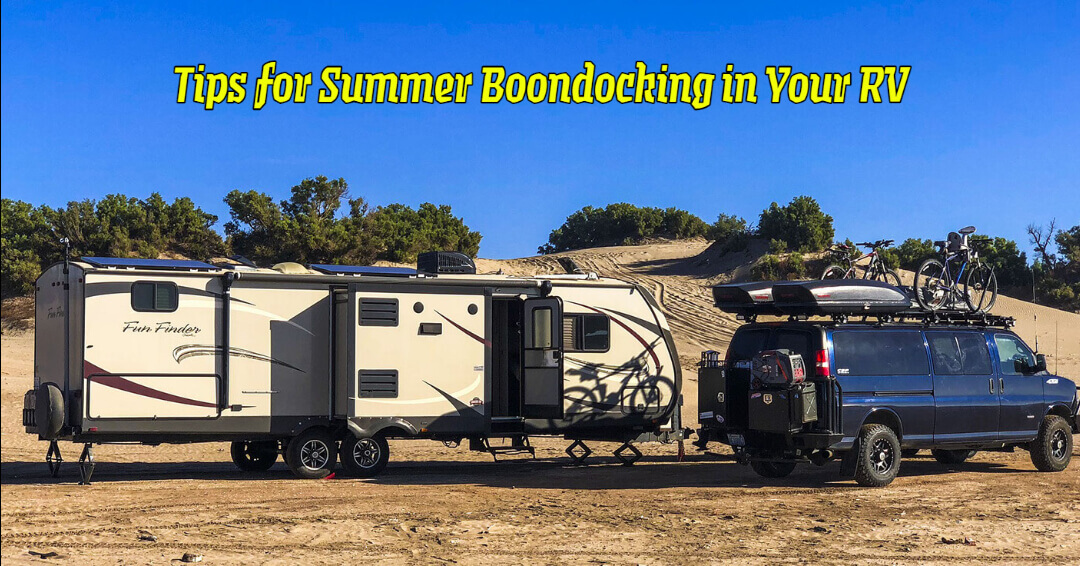- Home Page
- More RVing Tips & Tricks
- Tips for Summer Boondocking in Your Rv
7 Tips for Summer Boondocking in Your RV
These 7 tips for summer boondocking in your RV will get you ready for your summer RV boondocking Adventure.
By Darla Preston
Luxury campgrounds have become a true haven for RVers, as they often have just as many, if not more, high-end amenities as an upscale hotel. While it’s always appealing to indulge in the finer things in life, sometimes it’s more enticing to give into your thirst for adventure, strip yourself of everyday conveniences, and immerse yourself into the forces of nature. Follow these 7 tips for summer boondocking in your RV so you can start your RV Boondocking adventure.
About Boondocking
Boondocking, also referred to as dry camping, is still such a big part of the RV community. It’s RVing without the hookups and the comfort of the campground; it’s basically traditional camping, only in an RV instead of a tent.
If you’ve been wanting to give boondocking a chance yourself, here are a few starter points to get you on the right track:
Research Your Destination Carefully
When it comes to boondocking, your first inclination may be to just drive into the sunset and see where the wind guides you, but unfortunately, there are regulations and rules to keep in mind when scouting your location. For example, some places may allow fires, others won’t.
The point is that you should research your destination thoroughly so that you know you can legally camp there as well as what guidelines you should follow.
To help you find the right spot for you, check out this list of resources to help you find the perfect boondocking area to take your RV.
Inform a Friend or Relative of Your Itinerary
Once you have your sails set on a specific location, draft up an in-depth itinerary to give to friends or family, and similarly, let them know when they can expect you to make contact with them. Since you might not have a cell phone reception deep in the wilderness, it’s a good idea to keep close ones up to date on where you’ll be and when you’ll be there. That way, if anything were to go awry, your loved ones would take notice and be able to contact help if something went off its expected course.
Beat the Heat Without Draining Your Power

Whether you’re using batteries, generators, solar panels, power inverters, or a combination of the four, you want to minimize your power usage when boondocking. Unlike campground RVing, you don’t have an unlimited source of electricity to use at your whim, and the intense summer heat can put a damper on your good times.
The good news is that there are other options you can utilize to help you stay cool in the sizzling summer sun:
- Create shade with an RV awning: you can use your awning to get away from the blistering heat while still enjoying the outdoors. To expand the amount of shade available to you, consider adding an awning attachment to make an outdoor room or a larger outdoor patio area.
- Orientation matters: Where you park your RV can have a significant effect on the level of heat you deal with. Obviously, if you’re using solar power, you want to park so that the panels can soak up the sun, but if you are hoping to cool down the inside of the RV, you should try to park the windows so that they are in the shade. This way, the cooler temperature of the shade will penetrate through the windows instead of the hot sun rays.
- Avoid cooking inside. If the area you’re boondocking allows fires or outdoor grills, try to prepare meals outside as much as possible, as indoor cooking will cause the temperatures of your RV to rise significantly.
- Create air flow. Consider taking along a few battery-charged fans to help create some airflow in your RV and reduce the stuffiness. If you’re parked in the shade, or it’s during the early morning or evening, consider opening the windows as well to get the cool air circulating.
Plan Your Water Situation Carefully
Taking showers, flushing purposes, washing dishes, washing off produce, staying hydrated--it’s not until you have a limited supply of water that you realize how many purposes require the vital fluid.
Your water usage needs to be carefully thought out, as winging your water situation could cut your boondocking trip short and send you right back to the nearest city.
To conserve water in your tank, consider picking up several large jugs of drinking water at the nearest town (or however many will be adequate for the duration of your trip) where you’ll be boondocking. This way, you can reserve your tank for the other necessities without allowing the extra weight of the water jugs to drain your gas mileage.
There is no shortage of tactics to help you minimize your water waste. The video below has some in-depth water conservation tips on how to use as little as possible when it comes to cleaning, flushing, showering, etc.

Know Where to Go If an Emergency Pops Up
As mentioned before in these 7 tips for summer boondocking in your RV, dry camping doesn’t often provide you with the clearest cell phone signal, so always jot down a list of directions on how to get to the nearest hospital or other emergency services in the area. If an urgent matter were to come up and you weren’t around any other campers, it’s important that you know how to access assistance. Make sure you have this information clearly lined up before hitting the road.
Be Prepared for Wildlife Encounters
While doing your preliminary investigative work on where you’ll be boondocking, pay attention to the type of wildlife you can expect to see so that you can take the necessary precautions. For example, if bears could be bumbling around your campsite, you might want to be extra cautious in packing up food, and you might want to also bring a can of bear spray.
Similarly, if you’re bound to cross paths with rattle snakes, it’s a good idea to bring a snake bite kit with you as well. The more familiar you what kind of critters you’ll be coexisting with in the wild, the less likely you are to experience any unfortunate mishaps.
Be Courteous
When you’re a guest in Mother Nature’s house, it’s important to keep it in as good condition as you found it, meaning don’t leave your garbage behind. Clean up after yourself and dispose of your dirty water ethically.
On a similar note, you want to be courteous of any other RVers you cross paths with as well. If they are choosing to forgo the comfy campground in favor of boondocking, it means they’re looking for a bit of seclusion, so don’t park in a way that’s too close for comfort; give them the space that they intended on having.
There you have it; hopefully these 7 tips for summer boondocking in your RV will leave you better prepared to start planning your boondocking journey. If you have any of your own advice to share, tell us your thoughts and experiences in the comments below!
About The Author
Darla Preston enjoys helping fellow travelers enjoy their time out on the road by offering advice and insight. She frequently writes about the joy she's experienced since giving into her wanderlust.






Comments
Do you have a comment on this topic? You can leave your comment in the box below.